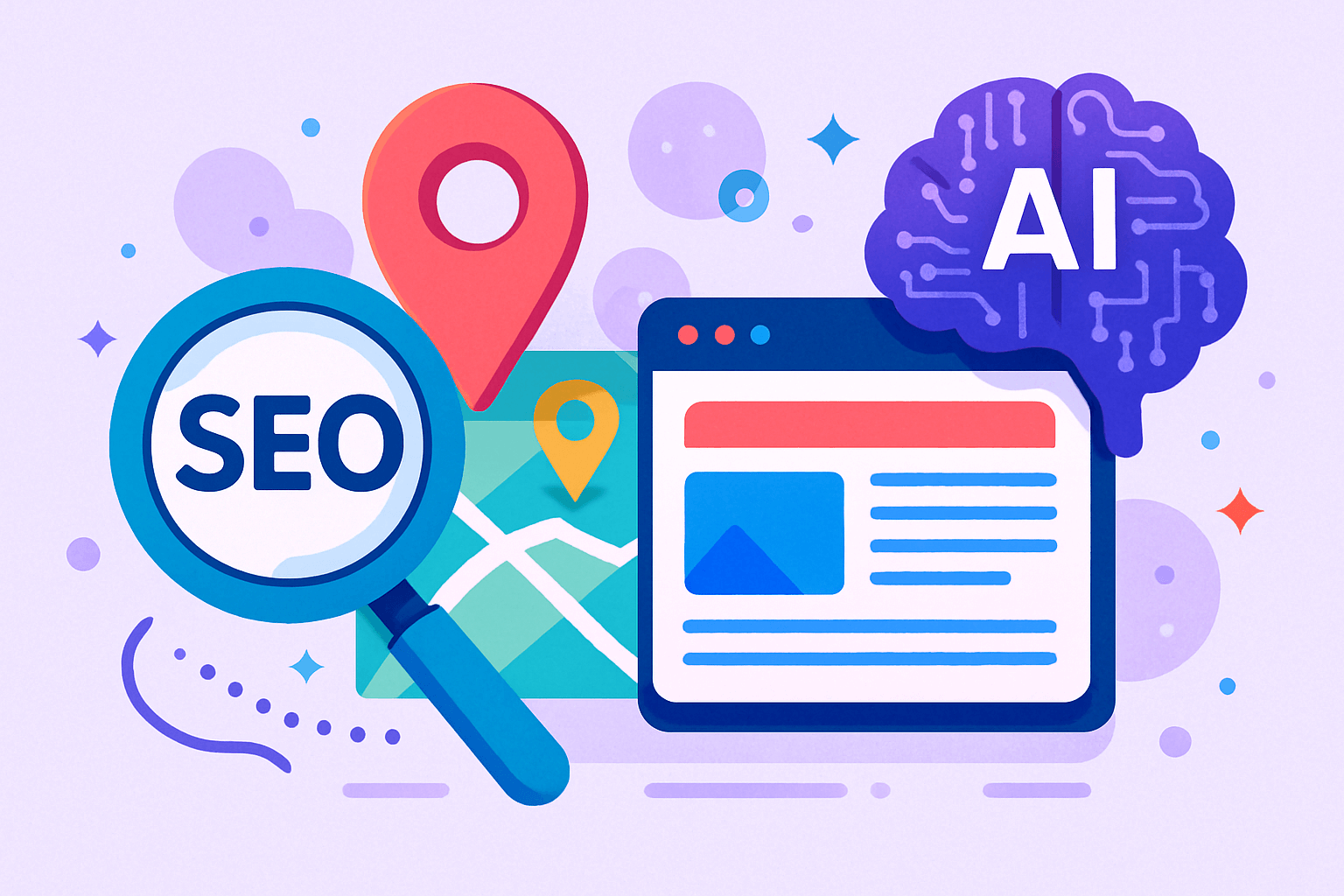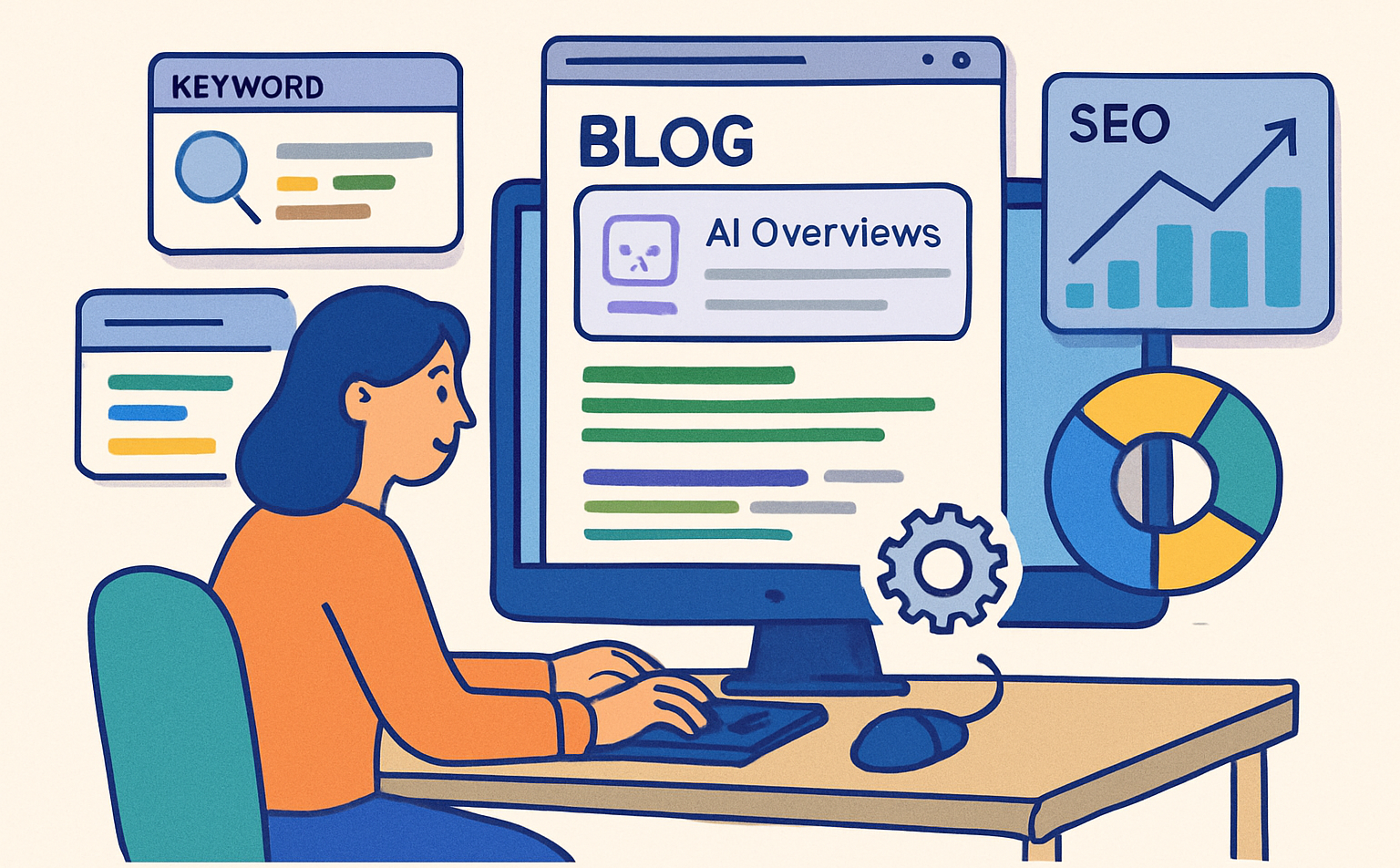
Getting your business found online has become more complex with AI tools like ChatGPT and Perplexity changing how people search. This guide shows you simple ways to make your business visible in these new AI search tools while still ranking well on Google.
What is AI Search Optimization?
AI search optimization means making your website easy for AI tools to understand and recommend. Unlike regular Google searches that show lists of websites, AI tools give direct answers and mention specific businesses. Think of it as making your business the go-to source that AI recommends to people looking for your services.
The main difference is simple: regular SEO helps you rank in search results, while AI optimization gets you mentioned in AI answers.
Why Your Business Needs AI Optimization Now
Over 58% of Google searches now end without clicking any link because AI gives answers directly. This means people might never visit your website, but they still see your business name if you’re optimized correctly.
AI tools like ChatGPT had over 55 billion visits from April 2024 to March 2025, growing 80% year over year. These aren’t just tech users – regular customers are using AI to find local businesses.
Simple On-Page SEO for AI and Google
Write Clear, Direct Answers
AI tools love content that answers questions directly. Start each section with a clear answer, then add details.
Good example: “Yes, we offer 24-hour plumbing services in downtown Boston. Our emergency team responds within 30 minutes.”
Bad example: “When you’re facing plumbing issues, you might wonder about availability…”
Use Simple English and Short Sentences
Keep sentences under 20 words. Break up long paragraphs into 2-3 sentences each. AI tools prefer content that sounds like a helpful friend explaining something.
Structure Your Content Well
Use clear headings (H1, H2, H3) that describe what each section covers. Make lists with bullet points or numbers when explaining steps. This helps both Google and AI tools understand your content better.
Include Local Information Naturally
Mention your city, neighborhood, and service areas in your content naturally. Instead of just “plumbing services,” write “emergency plumbing services in downtown Denver near Union Station”.
Geographic (Geo) SEO for Local Businesses
Keep Your Business Information Consistent
Your business Name, Address, and Phone number (NAP) must be identical everywhere online. This includes your website, Google Business Profile, Yelp, Facebook, and directory listings.
Critical: Even small differences like “St.” vs “Street” can confuse AI tools and hurt your rankings.
Optimize Your Google Business Profile
This is your most important local listing:
- Complete all sections, including hours, services, and photos
- Add business attributes like “wheelchair accessible” or “accepts credit cards”
- Respond to all reviews quickly and professionally
- Post regular updates about your business
Use Location-Based Keywords
Target phrases people actually use when searching:
- “24-hour auto repair near Michigan Avenue”
- “affordable brake repair shops in Brooklyn”
- “certified transmission specialist with same-day service”
Technical SEO for AI Search
Allow AI Crawlers to Access Your Site
Check your robots.txt file to make sure you’re not blocking AI bots:
- Allow OAI-SearchBot (ChatGPT)
- Allow Bing bot
- Submit your sitemap to Bing Webmaster Tools
Add Schema Markup
Schema markup is code that helps AI understand what your business does. The most important types for local businesses are:
- LocalBusiness schema for your main business info
- FAQPage schema for common questions
- Review schema for customer reviews
You can use Google’s free Schema Markup Helper to add this code.
Make Your Site Fast and Mobile-Friendly
AI tools prefer websites that load quickly and work well on phones. Use Google’s PageSpeed Insights to check your site speed and mobile-friendliness.
Content That AI Tools Love
Answer Common Questions
Create content that directly answers what customers ask:
- “What are your hours?”
- “Do you offer emergency services?”
- “How much does [service] cost?”
- “What areas do you serve?”
Include Specific Details
AI tools prefer concrete information over vague descriptions:
- Specific prices or price ranges
- Exact service areas
- Operating hours
- Contact information
- Certifications and licenses
Add Fresh, Accurate Information
Keep your content updated with current information. AI tools favor recent content and accurate details. Remove outdated information regularly.
Use Statistics and Facts
Include real data when possible:
- “We complete 95% of repairs in one visit”
- “Average response time: 20 minutes”
- “Serving the Denver area for 15 years”
Simple Ways to Build Authority
Get Listed in Local Directories
Submit your business to relevant local directories:
- Google Business Profile (most important)
- Yelp
- Apple Maps
- Industry-specific directories (HomeAdvisor for contractors, TripAdvisor for restaurants)
Encourage and Respond to Reviews
Reviews are crucial for AI recommendations:
- Ask satisfied customers to leave reviews
- Respond to all reviews professionally
- Address negative reviews constructively
- Use review responses to add helpful information
Create Helpful Local Content
Write about topics that help your local community:
- Local events you’re participating in
- Community problems you solve
- Local partnerships or sponsorships
- Area-specific tips and advice
Quick Checklist for AI Optimization
Website Basics:
- NAP information is identical everywhere
- Contact info is in plain text (not images)
- Site loads fast on mobile devices
- AI crawlers are allowed in robots.txt
Content:
- Answers common customer questions directly
- Uses simple, clear language
- Includes local keywords naturally
- Has up-to-date information
Local Listings:
- Google Business Profile is complete
- Listed in relevant directories
- All information matches exactly
- Reviews are monitored and responded to
Technical:
- Schema markup is added
- Sitemap submitted to search engines
- Site structure uses clear headings
- Images have descriptive alt text
Common Mistakes to Avoid
Don’t stuff keywords unnaturally. Write for humans first, then optimize for search engines.
Don’t ignore negative reviews. Respond professionally to build trust with AI tools and customers.
Don’t use different business names across platforms. Consistency is key for AI recognition.
Don’t forget to update information when it changes. Outdated hours or phone numbers hurt your credibility.
Measuring Your Success
Track these important metrics:
- Local search rankings for your key terms
- Google Business Profile views and actions
- Reviews and ratings
- Website traffic from local searches
- Phone calls and direction requests
Use Google Search Console and Google Business Profile insights to monitor your progress.
Getting Started Today
Start with these three simple steps:
- Audit your NAP consistency across all online listings
- Complete your Google Business Profile with all available information
- Create one piece of content that directly answers a common customer question
AI search optimization doesn’t require technical expertise or big budgets. Focus on providing clear, helpful information about your business, and both AI tools and customers will find you more easily.
The businesses that start optimizing for AI search now will have a significant advantage as more people adopt these tools for finding local services.






